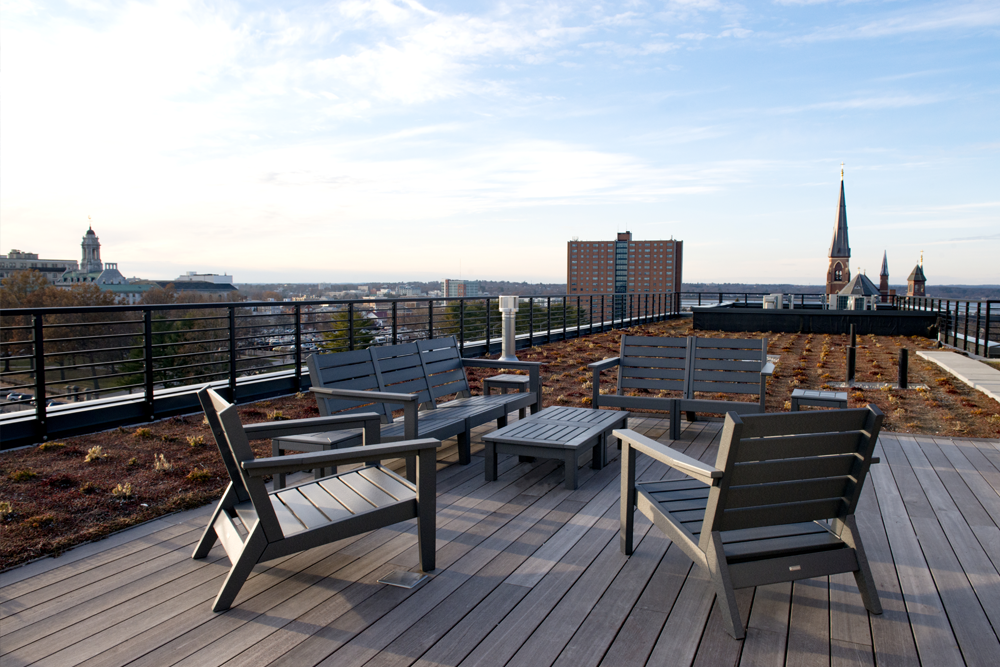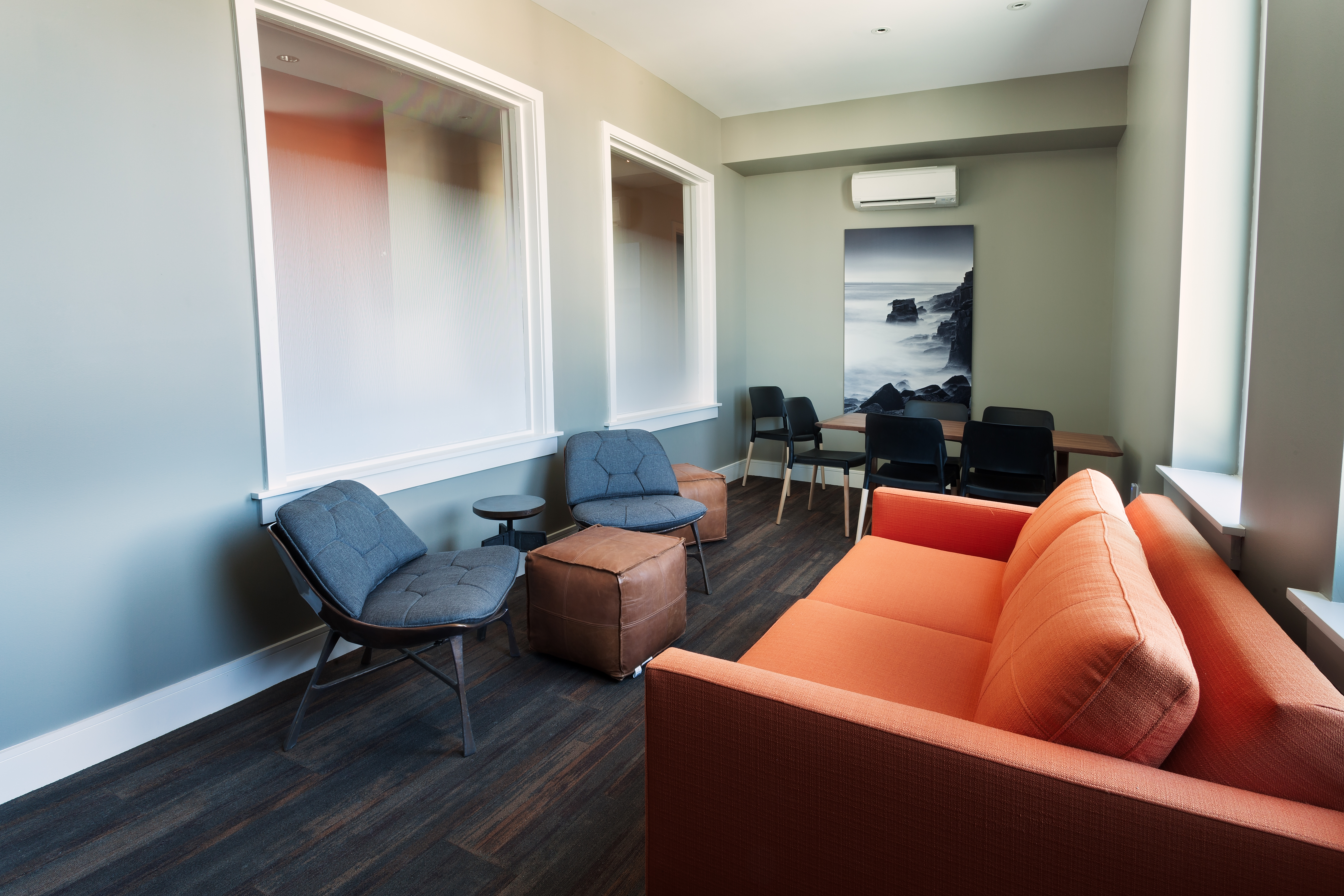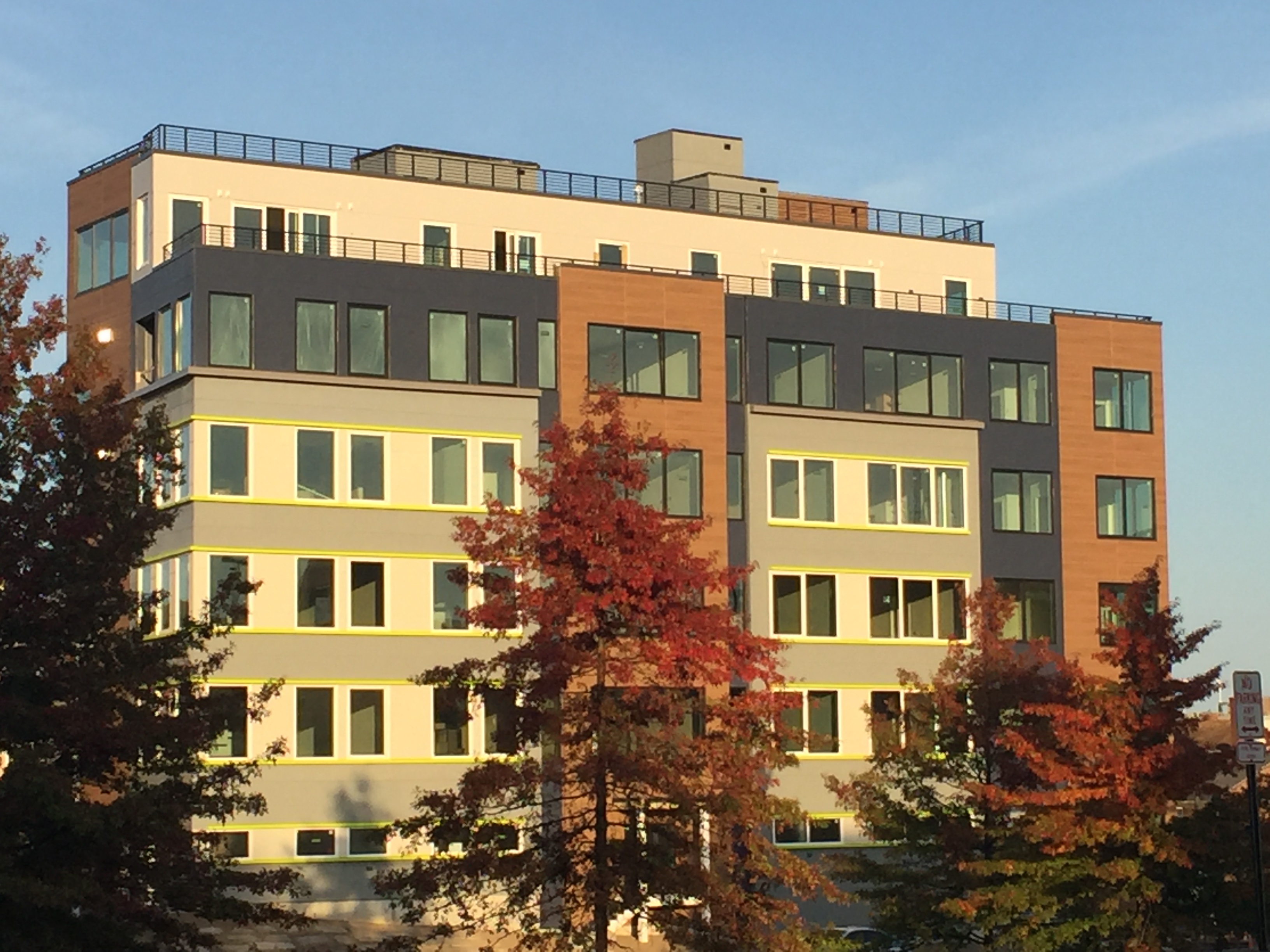In multi-part series, exclusive to the Maine Real Estate Insider, we’ll provide an up-close look at the most notable commercial development projects of the past year that are helping to fuel Maine’s economy in terms of investment and job creation. MEREDA is proud to recognize responsible development based upon criteria including environmental sustainability, economic impact, energy efficiency, difficulty of the development, uniqueness, social impact and job creation. Please join with us in celebrating Luminato Condominiums.
MEREDA: Describe the building and project.
Luminato Condominiums: Luminato Condominiums is a newly constructed residential project on Franklin Street in Portland’s East End. It includes 24 market-rate units ranging from 1 to 3 bedrooms at prices from the mid $200,000s to more than $1,000,000. The intention was to offer home ownership at a variety of unit sizes and price points in order to support the creation of a diverse residential community. Unit layouts include signature NewHeight Group features such as one level living, ceilings that reach 10 feet, oversized triple glazed windows, and raised rooms that let in light while also creating storage underneath the room.
Luminato offers forward-thinking features that help make day-to-day life hassle free—a dedicated mailroom where deliveries are out of sight and secure, indoor parking that includes storage units above the cars, and shared storage for bikes, skis and sports gear. Residents share innovative amenities including a fitness room, a guest room for overnight visitors, a lounge, and a roof-top deck with 360 degree views. See luminatocondos.com.
Luminato set a record as all 24 units in the building were under contract more than six months prior to construction completion. Luminato contributed substantively to the city’s tax base, creating 24 housing units on the same footprint formerly occupied by 5 housing units.
MEREDA: What was the impetus for this project?
Luminato Condominiums: One aspiration that drove the creation of Luminato was to offer opportunities for workers and business owners contributing to the Maine economy to purchase a new home in a well-constructed building at a total annual cost comparable to renting one of the new Class A apartments being constructed in Portland. We hoped to create a community of diverse owners who shared a sense of engagement in Portland, and we believe this goal was achieved. Buyers include a banker, a scientist, a nurse, an interior designer, a tech worker, and an architect, among others. Five buyers own businesses in Maine while nine others work for Maine-based organizations. Only one buyer is retired. Buyers range in age from 20-something to 70-something. Five buyers are first-time homeowners. There are no investors.
MEREDA: That sounds like quite a process. How long were you in the planning stages before construction started?
Luminato Condominiums: We started discussions with the landowner in the fall of 2015 and finalized the land acquisition at the end of that year. We spent the first quarter of 2016 in the City of Portland approval process, obtaining our subdivision approval in late March. By May of 2017 all units were under contract. We broke ground in August of 2016 and delivered the first units in October of 2017. We turned operation of the Condominium Association over to the homeowners in February of 2018.
MEREDA: Tell us about the most challenging aspect of getting this project completed.
Luminato Condominiums: Labor shortages proved to be our greatest challenge, something to which we are sure all business owners in Maine can relate. We were not willing to sacrifice quality for speed, so we worked with Landry/French Construction, our general contractor, to find the best possible tradesmen and keep them on the job until finished. Construction projects in Maine and around the country are competing for skilled labor. Almost all projects under construction in 2017 experienced a manpower shortage, adding complications to the construction process, timeline, and budget of building state-of-the-art projects.
In addition, being the first to apply under the form-based code and the inclusionary zoning required creativity and engagement of the city planning department and other organizations. The Luminato project team collaborated with Community Housing of Maine to workforce housing units on a contiguous parcel versus contributing to the city housing fund.
MEREDA: Something unexpected you learned along the way was…
Luminato Condominiums: We have been thrilled at how the green roof we incorporated not only provides our storm water management system, but also provides a truly beautiful natural surround to the shared roof deck and the private decks on the sixth floor. It changes color by season, but is interesting in all seasons, we have discovered.
MEREDA: Now that it’s complete, what feature of the project do you think makes it the most notable?
Luminato Condominiums: In terms of a physical feature, Luminato is the first newly constructed building in the Urban Transition district of the new India Street Neighborhood Form Based Code. It provides the start of what will hopefully be a series of well-designed structures on the east side of Franklin Street, providing an attractive, contemporary introduction to residents and visitors arriving in Portland via Franklin Street from I-295 and elsewhere.
Portland’s use of the India Street Form Based Code as a tool to foster more desirable, dense development of urban dwellings, especially along the city’s arterials and broader urban streets made it possible for Luminato to rise 77 feet above grade. The form-based code encourages taller buildings along Portland’s main thoroughfares of Franklin and Congress Streets and replaces a patchwork of zoning districts with a cohesive approach to achieving the goals of the new India Street Neighborhood Plan.
The form based code replaces inconsistent, and often self-defeating, minimum lot size requirements with requirements relating to the form, character and architecture of a building so that it fits harmoniously into its surrounding environment. As a result, Luminato creates an interesting facade with angled walls, inset decks, and since it steps back as it gets taller, terraces that are surrounded by green roof. All of these features are unusual among residential buildings completed or under construction in Portland.
In terms of a lifestyle feature, Luminato embraces and promotes the concept of “living light” as part of a shared economy philosophy. In particular, 12 one-bedroom units under 780 square feet (one-half of the total 24 units) were included in the design. These unit owners find the shared amenities – a guest room they can reserve for overnight visitors, a lounge for quiet time or small meetings, a well-equipped fitness room, and the roof deck – particularly attractive, enabling them to “buy small while living large.” The goal was to keep the price point reasonable, design innovative layouts, and offer more value by providing owners with access to ample shared spaces within the building.
Finally, we would be remiss if we did not mention that in support of Maine’s creative economy, Luminato engaged local craftspeople such as Westbrook-based furniture maker Furniturea to provide furnishings for Luminato, and three Maine artists, including two Maine College of Art (MECA) graduates, were commissioned to create artworks for the building’s public spaces.
The all-local project team included NewHeight Group, Archetype Architects, Landry/French Construction and Saco & Biddeford Savings Institution. In support of Maine’s creative economy, NewHeight Group engaged local craftspeople to provide furnishings and three Maine artists were commissioned to create artworks for the building’s public spaces.



